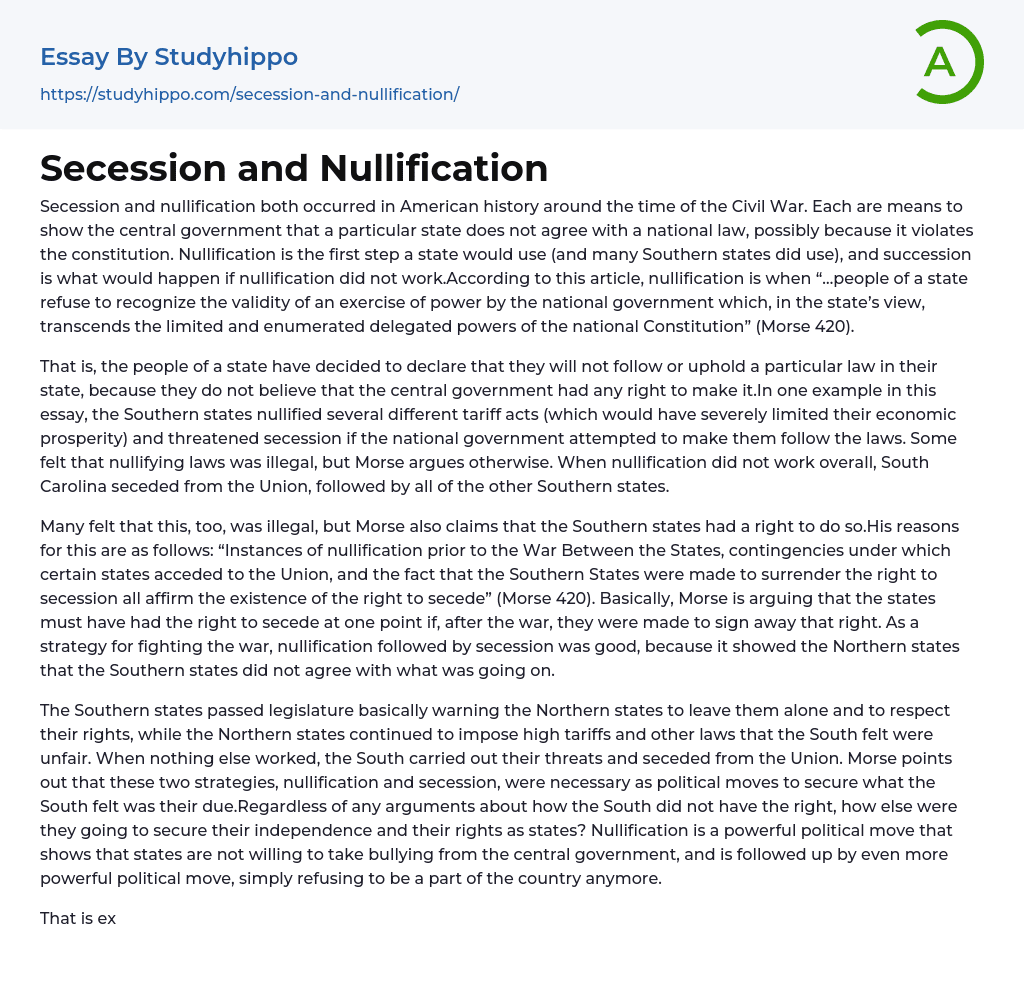Secession and nullification both occurred in American history around the time of the Civil War. Each are means to show the central government that a particular state does not agree with a national law, possibly because it violates the constitution. Nullification is the first step a state would use (and many Southern states did use), and succession is what would happen if nullification did not work.According to this article, nullification is when “…people of a state refuse to recognize the validity of an exercise of power by the national government which, in the state’s view, transcends the limited and enumerated delegated powers of the national Constitution” (Morse 420).
That is, the people of a state have decided to declare that they will not follow or uphold a particular law in their state, because they do not believe that t
...he central government had any right to make it.In one example in this essay, the Southern states nullified several different tariff acts (which would have severely limited their economic prosperity) and threatened secession if the national government attempted to make them follow the laws. Some felt that nullifying laws was illegal, but Morse argues otherwise. When nullification did not work overall, South Carolina seceded from the Union, followed by all of the other Southern states.
Many felt that this, too, was illegal, but Morse also claims that the Southern states had a right to do so.His reasons for this are as follows: “Instances of nullification prior to the War Between the States, contingencies under which certain states acceded to the Union, and the fact that the Southern States were made to surrender the right to secession al
affirm the existence of the right to secede” (Morse 420). Basically, Morse is arguing that the states must have had the right to secede at one point if, after the war, they were made to sign away that right. As a strategy for fighting the war, nullification followed by secession was good, because it showed the Northern states that the Southern states did not agree with what was going on.
The Southern states passed legislature basically warning the Northern states to leave them alone and to respect their rights, while the Northern states continued to impose high tariffs and other laws that the South felt were unfair. When nothing else worked, the South carried out their threats and seceded from the Union. Morse points out that these two strategies, nullification and secession, were necessary as political moves to secure what the South felt was their due.Regardless of any arguments about how the South did not have the right, how else were they going to secure their independence and their rights as states? Nullification is a powerful political move that shows that states are not willing to take bullying from the central government, and is followed up by even more powerful political move, simply refusing to be a part of the country anymore.
That is exactly what the Southern states did, and although it did not work out very well for them in the end, it was a good way to make the North understand their position.
- Rabbit essays
- Distribution essays
- Large Animals essays
- Mouse essays
- Poultry essays
- Animal Abuse essays
- Cats Vs Dogs essays
- Cattle essays
- Territory essays
- Business Law essays
- Contract essays
- Consumer Protection essays
- Property essays
- Ownership essays
- Agreement essays
- Common Law essays
- Contract Law essays
- Justice essays
- Security essays
- Tort Law essays
- United States Constitution essays
- Crime essays
- Lawsuit essays
- Treaty essays
- Family Law essays
- Marijuana Legalization essays
- Constitution essays
- War on Drugs essays
- Court essays
- Jury essays
- Police essays
- Protection essays
- Community Policing essays
- Criminal Law essays
- Judge essays
- Lawyer essays
- Employment Law essays
- Copyright Infringement essays
- Injustice essays
- Intellectual Property essays
- Breach Of Contract essays
- Jurisprudence essays
- Social Injustice essays
- Juvenile Justice essays
- Internet Privacy essays
- Cyber Security essays
- Bill Of Rights essays
- Civil Liberties essays
- First Amendment To The United States Constitution essays
- Fourth Amendment To The United States Constitution essays




